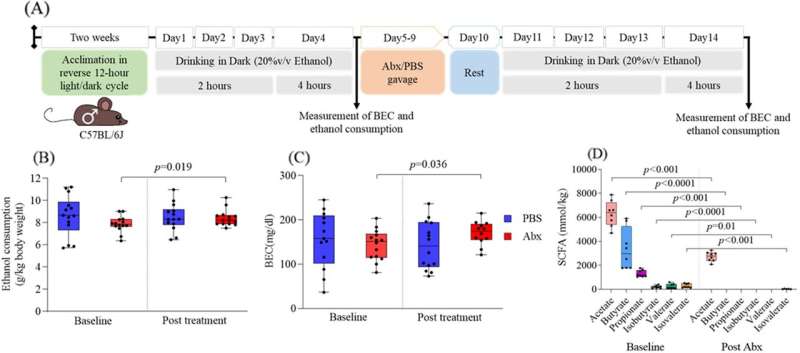
Binge consuming considerably will increase the chance of alcohol habit. In a research revealed in Microbiome on June 17, a workforce led by College of Connecticut College of Drugs researchers studies that valeric acid, a substance made by intestine micro organism, reduces binge consuming in mice. Their findings open a brand new avenue within the seek for therapies for alcohol abuse.
Binge consuming is a sample of extreme alcohol consumption through which a person consumes a big amount of alcohol in a brief interval, usually resulting in a blood alcohol focus of 0.08% or greater. Based on the Nationwide Institute on Alcohol Abuse and Alcoholism, 4 or 5 drinks over two hours convey blood alcohol to that degree. Research point out that one out of three younger Europeans and North People frequently engages in binge consuming, placing them at elevated threat of growing alcohol use dysfunction and different neuropsychiatric issues later in life.
Regardless of the widespread prevalence and opposed penalties of alcohol misuse, efficient pharmacological therapies are restricted. Presently, solely three FDA-approved medicine can be found to deal with alcohol use dysfunction, and they don’t seem to be notably efficient for most individuals.
UConn College of Drugs microbiome scientist Yanjiao Zhou was intrigued by findings that confirmed people who binge drink typically have completely different patterns of microorganisms of their intestine than individuals who don’t binge drink. Their intestine microorganisms, known as the intestine microbiome, additionally tended to supply a distinct mixture of short-chain fatty acids (SCFAs). SCFAs are produced by the intestine microbiome through the fermentation of undigested dietary fibers and proteins. It appeared doable that the combination of SCFAs produced by the intestine organisms may be influencing consuming patterns.
To discover the potential connection between SCFAs and binge consuming, Zhou and her colleagues used a four-day “consuming at the hours of darkness” mouse mannequin. This mannequin mimics binge consuming in people. Mice got various kinds of SCFAs with their feed for 10 days.
Then the mice had been allowed to drink alcohol (20% ethanol blended with water, the mice do not get cocktails) at evening for a while over 4 nights. Mice fed valeric acid however not different varieties of SCFAs drank 40% much less alcohol and had blood alcohol ranges 53% decrease than the opposite mice. These mice additionally exhibited lowered anxiety-related behaviors.
“The discovering that valeric acid reduces consuming is shocking,” says Suresh Bokoliya, a postdoc within the Zhou lab. “Valeric acid is low in focus within the intestine in comparison with different frequent SCFAs corresponding to butyrate and acetate.”
When the workforce appeared additional into how valeric acid reduces consuming, they discovered mice supplemented with valeric acid had elevated ranges of GABA, a chemical identified for its calming impact, within the amygdala, a mind area related to temper and addictive behaviors. In addition they discovered that genes concerned in vitality manufacturing and anti inflammatory actions had been extra lively, and genes associated to melancholy had been much less lively.
“A number of mechanisms are doubtless at play in how valerate reduces consuming,” says Zhou. “However the affect of this microbial metabolite on mind epigenetics might be fairly highly effective in regulating consuming behaviors.”
The Zhou lab labored in shut collaboration with Jon Covault from the Alcohol Analysis Middle at UConn, Jason Bubier from The Jackson Laboratory, and Jessica Barson at Drexel College. The researchers at the moment are testing this method in different mouse fashions that extra carefully approximate alcohol habit to see if valeric acid can successfully deal with alcohol dependence in people.
Extra info:
Suresh C. Bokoliya et al, Brief-chain fatty acid valerate reduces voluntary alcohol consumption in male mice, Microbiome (2024). DOI: 10.1186/s40168-024-01829-6
Quotation:
Intestine micro organism would possibly discourage binge consuming (2024, June 20)
retrieved 20 June 2024
from https://medicalxpress.com/information/2024-06-gut-bacteria-discourage-binge.html
This doc is topic to copyright. Other than any truthful dealing for the aim of personal research or analysis, no
half could also be reproduced with out the written permission. The content material is offered for info functions solely.
